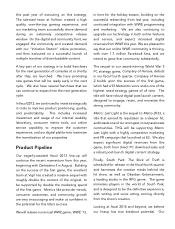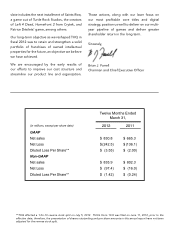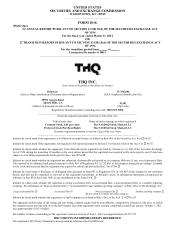THQ 2012 Annual Report Download - page 13
Download and view the complete annual report
Please find page 13 of the 2012 THQ annual report below. You can navigate through the pages in the report by either clicking on the pages listed below, or by using the keyword search tool below to find specific information within the annual report.5
The first modern video game platform was introduced by Nintendo in 1985. Since then, advances in technology have resulted
in continuous increases in the processing power of the chips that power both the consoles and PC. Today's major video game
consoles, the PS3, Xbox 360 and Wii, are not simply gaming platforms, but also function as multimedia hubs that can deliver
high-quality digital movies and television programs. These consoles all have Internet connectivity, allowing players to play
online against other players and to download games and content directly from the Internet to the gaming console. Video games
are also played on PCs that contain powerful graphics cards, and on advanced handheld devices such as the PSP and DS.
Additionally, both online gaming and mobile and tablet gaming have become popular platforms for video game players over
the last several years and are expected to be fast growing segments of our business. We believe that the ongoing transition to
the digital delivery of games represents a beneficial change to our business. Digital delivery in all of its forms allows for
consumers to easily sample games before buying them; allows for a reduction in piracy due to the persistent internet connection
in the game, and allows for direct opportunities to interact with our consumers and offer them new products and services.
Accordingly, we plan to continue integrating a digital component into our franchises where applicable, thus creating an
ecosystem which we believe will retain consumers and generate increased revenues.
Our Products
We primarily develop, market and sell video games and other interactive software and content for play on console platforms,
handheld platforms, mobile devices, PCs and online. The following products generated 10% or more of our net sales, before
the impact of changes in deferred net revenue, during the respective fiscal years:
• in fiscal 2012, Saints Row: The Third, WWE '12;
• in fiscal 2011, Homefront, uDraw, UFC Undisputed 2010, and WWE SmackDown vs. Raw 2011; and
• in fiscal 2010, UFC 2009 Undisputed and WWE SmackDown vs. Raw 2010.
Our games are based on intellectual property that is either wholly-owned by us or licensed from third parties under extended
terms. We develop our games using both internal development resources and external development resources working for us
pursuant to contractual agreements. Whether a game is developed internally or externally, upon completion of development we
extensively play-test each game, and if required, send the game to the platform manufacturer (Microsoft, Nintendo or Sony) for
its review and approval. Our console-based and handheld-based video games are manufactured for us by the platform
manufacturers (or their authorized vendors). We then market and distribute our games for sale throughout the world.
Creating and Acquiring Our Intellectual Property
Our business process begins with an idea. Inspiration for our interactive entertainment software comes from many sources—
from our internal studios, our external studio partners, and from existing intellectual properties that we either license or acquire.
We create and acquire new intellectual properties that we own. We refer to these properties as our "owned intellectual
property[ies]". Our owned intellectual property is generally created by one of our development studios or by a third-party
developer with whom we contract. We have also acquired intellectual properties from other publishers or developers. The
titles we create based on our owned intellectual properties may contain certain licensed content, such as music or rights to use a
name or object (such as a brand-name vehicle). In this case, we enter into a license agreement with the content owner and pay
either a fixed fee or royalty for the use of such content. Our owned intellectual properties include: Company of Heroes,
Darksiders, Homefront, Red Faction, Saints Row, and new properties in development by Patrice Désilets and Turtle Rock
Studios.
In addition to creating and acquiring our owned intellectual properties, certain of our titles are based upon licensed properties
that have attained a high level of consumer recognition or acceptance. We have a relationship with Games Workshop and
create games based on their Warhammer 40,000 universe and we have a relationship with WWE and create games based on
their content. These intellectual property licenses generally grant us the exclusive use of the property for specified titles, on
specified platforms and for a specified license term. The licenses are of varying duration, and we pay royalties to our property
licensors generally based on our net sales of the title that includes the licensor's intellectual property. We typically advance
payments against minimum guaranteed royalties over the license term. Royalty rates are generally higher for properties with
proven popularity and less perceived risk of commercial failure.
Prior to June 1, 2012, we had a relationship with Zuffa, LLC to create games based on their UFC content. For further
information related to the transfer of this license, refer to "Note 22 — Subsequent Events" in the notes to the consolidated
financial statements included in Part II, Item 8 for further information.
























